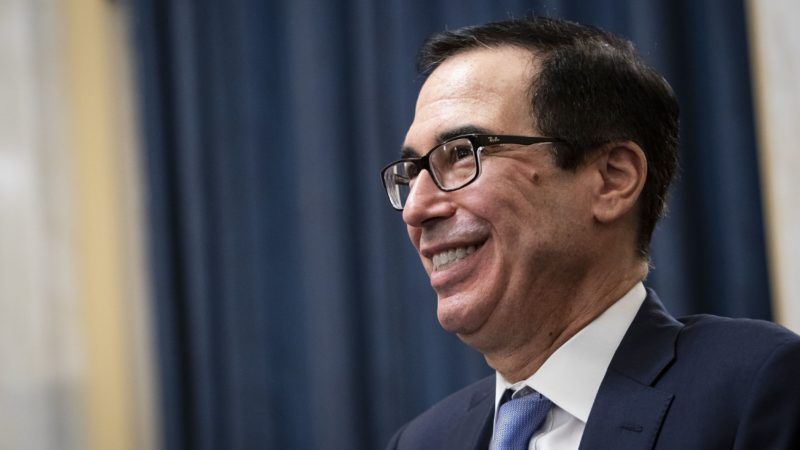Trump Administration Says Identities of Coronavirus Stimulus Loan Recipients Are 'Confidential'
Treasury Secretary Steve Mnuchin says that information is confidential. Government watchdogs say that excuse is bogus.

When the Obama administration pumped $787 billion into the U.S. economy through the 2009 stimulus bill, it drew criticism for wasting taxpayer dollars on politically connected industries, sending cash to places that literally don't exist, and funding "shovel-ready jobs" that weren't. Most Americans came away from the experience feeling the American Reinvestment and Recovery Act was a waste.
The Trump administration appears to have learned a lesson from all that: You should avoid criticism for wasteful spending—by not letting anyone know where the money is going in the first place.
Treasury Secretary Steve Mnuchin announced this week that the administration will not make public the names of businesses that received taxpayer-backed loans through the Small Business Association's Paycheck Protection Program (PPP). The PPP was created as part of the Coronavirus Aid, Relief, and Economic Security (CARES) Act in March; by May 30, it had provided more than 4.5 million loans worth more than $500 billion.
Though recipients of Small Business Association loans are usually identified in official government records, Mnuchin told a Senate committee this week that the Treasury department will keep information about PPP loan recipients "confidential."
"As it relates to the names and amounts of specific PPP loans, we believe that that's proprietary information," Mnuchin told the Senate Small Business Committee.
That's "bogus," says Danielle Brian, the executive director of the nonpartisan Project on Government Oversight. The CARES Act requires that information about loan recipients must be reported.
"The decision to hide the information is actually just a blatant attempt to dodge standard requirements for transparency and accountability," Brian said in a statement. "There's no good reason to keep this information private."
The Government Accountability Office (GAO), which is charged with oversight of the PPP program, has also struggled to get information from the administration.
The GAO has requested information on the establishment and management of the PPP program, but it has received only some of the information and only after a delay, GAO spokeswoman Sarah Kaczmarek tells Reason. The GAO has received "no information" about when it will receive data on "the PPP loan themselves," Kaczmarek says.
Several media outlets have filed a joint Freedom of Information Act (FOIA) request seeking the identities of businesses that received loans through the PPP program. The Project on Government Oversight plans to file a separate FOIA request seeking the data.
Unfortunately, this is not the only example of the Trump administration refusing to make coronavirus stimulus spending transparent or accountable. Almost since the moment the CARES Act passed, the administration has been dismantling the system of inspectors general responsible for overseeing key parts of the $3-trillion-and-counting coronavirus response. In an April 22 letter to the White House, Sen. Chuck Grassley (R–Iowa) said he worried the administration was trying to "strip IGs [inspectors general] of their fundamental ability to timely report waste, fraud, abuse, and misconduct in government programs to Congress."
That's just part of Trump's wider war on accountability, which has included the firing of a State Department inspector general who was reportedly investigating allegations that Secretary Mike Pompeo had asked a staffer to run personal errands, as well as the firing of a Department of Transportation inspector general who was investigating Secretary Elaine Chao for favoritism in awarding government contracts.
Administration officials and Sen. Marco Rubio (R–Fla.), who shepherded the PPP program through Congress, have been quick to praise the program's effectiveness in keeping unemployment down and ensuring that furloughed employees could quickly return to their jobs once lockdowns lifted. "The Paycheck Protection Program saved millions of jobs and small businesses during the most uncertain economic situation this nation has faced since the Great Depression," Rubio said Wednesday.
The program may indeed be partially responsible for lower-than-expected unemployment numbers. And because the PPP program paid businesses to keep employees on payroll, it may have helped reduce the "job matching" issues that slowed the recovery after the last recession. But the overall effectiveness of the PPP program or the federal government's wider coronavirus response cannot be measured if vital details are being hidden away.
Keeping loan recipients secret also means it is impossible for the GOA and independent watchdogs to assess how funds were disbursed and which businesses were given priority. In the early stages of the program, for example, several prominent Trump campaign donors received huge loans. Other loans went to entities that hardly seemed like small businesses in need of rescue, including the Los Angeles Lakers.
The Obama stimulus turned Solyndra into a metaphor for everything wrong with taxpayer-funded business bailouts. What is the Trump administration's Solyndra? Mnuchin doesn't want you to know.


Show Comments (17)